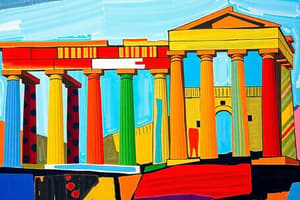Podcast
Questions and Answers
What role did Greek mythology play in shaping ancient Greek culture and society?
What role did Greek mythology play in shaping ancient Greek culture and society?
- It only influenced Greek art and architecture
- It influenced religious practices, culture, and society (correct)
- It focused solely on historical events
- It had no impact on Greek society
Which of the following is NOT a well-known Greek myth?
Which of the following is NOT a well-known Greek myth?
- The Twelve Labors of Hercules
- The story of Pandora's Box
- The epic tales of the Trojan War
- The journey of Odysseus (correct)
What aspects of beauty did Ancient Greek art and architecture often reflect?
What aspects of beauty did Ancient Greek art and architecture often reflect?
- Harmony, balance, and proportion (correct)
- Asymmetry and randomness
- Chaos and disorder
- Discord and conflict
Which order of Greek architecture is known for its intricate and decorative capitals?
Which order of Greek architecture is known for its intricate and decorative capitals?
What was a key feature of Ancient Greek democracy?
What was a key feature of Ancient Greek democracy?
Which of the following best describes the political system of Ancient Greece?
Which of the following best describes the political system of Ancient Greece?
Which ancient Greek city-state was known for its military prowess and emphasis on discipline?
Which ancient Greek city-state was known for its military prowess and emphasis on discipline?
Who was responsible for the establishment of the first known democratic constitution in Athens?
Who was responsible for the establishment of the first known democratic constitution in Athens?
Which ancient Greek philosopher is known for his method of questioning to stimulate critical thinking?
Which ancient Greek philosopher is known for his method of questioning to stimulate critical thinking?
What form of government was prevalent in ancient Greek city-states like Athens and Sparta?
What form of government was prevalent in ancient Greek city-states like Athens and Sparta?
Which ancient Greek city-state was a center of culture and politics and established the Athenian Constitution?
Which ancient Greek city-state was a center of culture and politics and established the Athenian Constitution?
What distinguished ancient Greek philosophy as an intellectual movement?
What distinguished ancient Greek philosophy as an intellectual movement?
Flashcards are hidden until you start studying
Study Notes
Ancient Greece: Exploring Greek Mythology, Art and Architecture, Democracy, City-states, and Philosophy
Greek Mythology
Greek mythology is a vast and varied collection of stories, legends, and beliefs that the ancient Greeks held about their gods, heroes, and the natural world. The mythology was deeply intertwined with the religious practices of the Greeks, and it played a significant role in shaping their culture and society. Some of the most well-known Greek myths include the story of Pandora's Box, the Twelve Labors of Hercules, and the epic tales of the Trojan War and the Argonauts.
Greek Art and Architecture
Ancient Greek art and architecture were renowned for their beauty and elegance, reflecting the Greeks' appreciation for harmony, balance, and proportion. The Greeks were particularly skilled in sculpture, painting, and pottery, producing works that often featured idealized human forms and scenes from mythology. In architecture, the Greeks are known for their innovative use of the Doric, Ionic, and Corinthian orders, which are still widely used today.
Ancient Greek Democracy
Ancient Greek democracy was one of the most significant political developments in the history of human civilization. It was a system of government in which power was held by the people, with all free adult males able to participate in the decision-making process. The Greeks' commitment to democracy can be seen in the establishment of the first known democratic constitution in Athens, the city-state that was one of the leading centers of Greek culture and politics. This constitution, known as the Athenian Constitution, laid the foundation for the democratic principles that would later inspire the modern democratic systems of the Western world.
City-states of Ancient Greece
City-states were the primary form of political organization in ancient Greece. These independent states, typically centered around a city, had their own governments, laws, and military forces. Some of the most famous city-states included Athens, Sparta, and Thebes. These city-states often formed alliances and engaged in conflicts with one another, shaping the political landscape of ancient Greece.
Ancient Greek Philosophy
Ancient Greek philosophy was a major intellectual movement that began in the 6th century BCE. The Greeks were the first to systematically explore questions about the nature of reality, knowledge, ethics, and human existence. Some of the most influential Greek philosophers include Socrates, Plato, and Aristotle. Their ideas have had a profound impact on Western thought and continue to shape our understanding of the world today.
In conclusion, ancient Greece was a civilization that produced a wealth of knowledge and achievement in various fields, from mythology and art to democracy and philosophy. Its influence on Western culture and thought is still felt today, making it a fascinating and enduring subject of study.
Studying That Suits You
Use AI to generate personalized quizzes and flashcards to suit your learning preferences.




